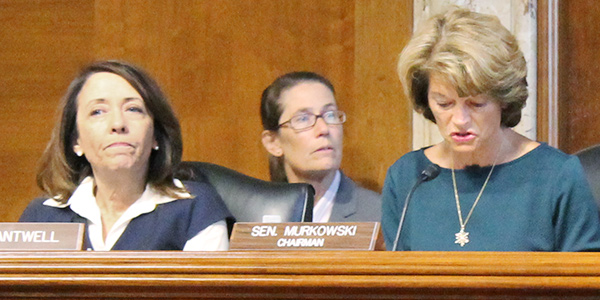By Michael Brooks
WASHINGTON — The Senate Energy and Natural Resources Committee advanced FERC nominee Bernard McNamee to the full Senate on Tuesday in a 13-10 vote, with most Democrats opposing him over his pugnacious advocacy of fossil fuels.
Chair Lisa Murkowski (R-Alaska) said she hoped for a Senate floor vote before the end of the year for McNamee, the executive director of the Energy Department’s Office of Policy.
Ranking member Maria Cantwell (D-Wash.) said she could not support McNamee because of his role in crafting DOE’s controversial Grid Resiliency Pricing Rule proposal. At his Nov. 15 confirmation hearing, Democrats had pressed McNamee to recuse himself from FERC’s proceeding on resilience, which the commission initiated in January after rejecting the DOE proposal. (See Democrats Urge McNamee’s Recusal from Resilience Docket.)
Democrats had also raised concerns about McNamee’s work earlier this year for the Texas Public Policy Foundation’s Center for Tenth Amendment Action and its Life: Powered initiative, described as a project to “reframe the national discussion” about fossil fuels.
These concerns were heightened after a video of a speech McNamee made in February at the TPPF’s 2018 Policy Orientation — apparently taken down after he was nominated — was leaked and posted to YouTube by the Energy and Policy Institute, a liberal advocacy group, last week.
In the speech, McNamee touted fossil fuels as “the key not only to our prosperity [and] quality of life, but also to a clean environment. What do you think powers the sanitation system, the clean water systems, that runs things that clean our air? It’s energy, it is 24-hour energy and it is energy that is produced from a very concentrated source in coal, oil and natural gas.”
He also attacked “an organized propaganda campaign against fossil fuels.”
“We see that the green movement is always talking about more government control because it’s the constant battle between liberty and tyranny. It’s about people who want to say, ‘I know what’s better for you.’ It’s the thing where groups are saying, ‘I want to be the one in charge, I know what’s good for you, and I’m going to ration it.’”
Cantwell said before Tuesday’s vote, “I would have liked to take Mr. McNamee at his word” that he would not be a partisan on generation fuels.
“But after the video has surfaced … I find it hard to believe that he is going to be the impartial reviewer of these issues,” she said. “His words revealed a very strong bias in favor of fossil fuel and against renewable energy.”
She noted that FERC nominee Ron Binz withdrew from contention in 2013 because some Senators accused him of being too supportive of renewables and critical of coal.
Speaking to reporters after the hearing, Murkowski said, “I don’t know if there was ever a ‘Binz Test.’ … We didn’t have him before us as a committee vote, if you’ll recall.”
Murkowski said McNamee’s comments on the video were “unfortunate.”
“I believe that we continue to need [fossil fuels], but we also recognize their role in the changes we’re seeing in our climate,” she said.
In an apparent reference to McNamee’s complaint on the video that renewables “screw up the whole physics of the grid,” she added, “It’s more appropriate to think of renewables as … a technical challenge for the grid, one that we can, and one that we will, overcome.”
Nevertheless, Murkowski said she would support McNamee based on his commitment to uphold FERC’s independence. “I will expect that he be fuel-neutral and not a champion for one resource over another,” she said.
After the vote, Sen. Martin Heinrich (D-N.M.) expressed disappointment that McNamee is “the best we can do” at FERC.
“I think he is indicative of the dividedness in this country right now — our inability to have a realistic conversation about climate. And I find both the video and his background to suggest that he is going to have a very difficult time being fair, objective or anything close to impartial.”
Sen. Joe Manchin (D-W.Va.) was the only Democrat to vote for McNamee.
Ari Peskoe, director of Harvard Law School’s Electricity Law Initiative, tweeted Monday that McNamee’s comments could be problematic if he joins FERC.
“His participation in any docket that includes comments from the ‘green movement’ — and especially any docket started with a complaint filed by an enviro group — creates a legal vulnerability,” Peskoe said. “There’s a chance a court would invalidate FERC’s order solely due to his participation.
“Case law does not establish a hard line with regard to bias. Challenging McNamee’s decision not to recuse himself from a docket based on filings from enviro groups is certainly not a slam dunk. But he’s a procedural liability for FERC. All risk, no gain.”
Murkowski said she did not know whether his nomination would be part of a vote on a package of other nominees. She also said she had “no idea” how long the Senate would be in session beyond Dec. 7, when its continuing resolution runs out. “Beyond that we’re operating in the great unknown.”
But she also said that as far as she knew, McNamee is not being considered along with another nominee to replace Commissioner Cheryl LaFleur, who term ends June 30, 2019, as some outlets have speculated. “All I can tell you about that is that I know as much about that as you do. … I have been given no indication that there’s going to be any early nomination, or how we will vote” on McNamee’s nomination. “It’s arduous enough to go through the vetting process and the length of time it takes” to go through the nomination process. “It’s important to [the nominees] that we try to get these wrapped up.”
[Editor’s Note: A previous version of this story incorrectly stated McNamee advanced on a “party-line” vote.]







